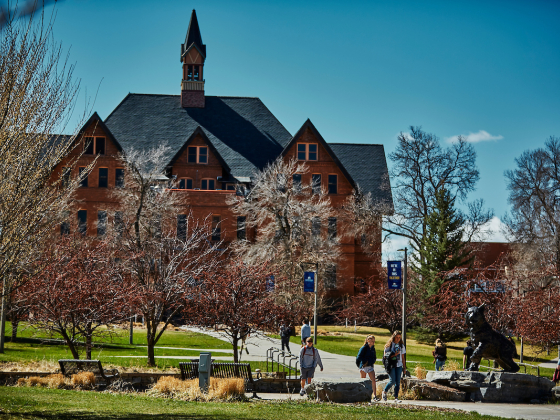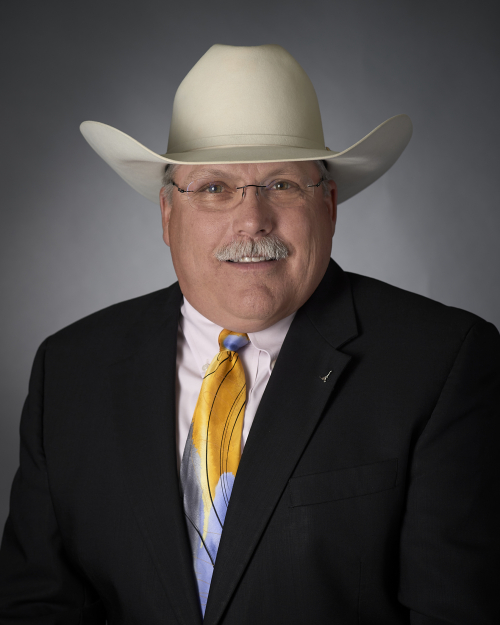BOZEMAN – Over 30 years at Montana State University, Darrin Boss has worn many hats, most frequently a cowboy hat. Since finishing his master’s degree in beef cattle nutrition in 1994 and his doctorate in plant science focusing on forages in 2007 – both at MSU – he has served as a research associate, assistant professor, research center superintendent and department head.
Now, Boss is the associate director of the Montana Agricultural Experiment Station and associate dean for research in MSU’s College of Agriculture, as well as superintendent of MSU’s Northern Agricultural Research Center in Havre, a post he’s held since 2011.
It is an extensive resume of service to Montana, but Boss’s land-grant history stretches much further back than three decades. He will recount his academic journey and the history of his passion for education in the first installment of MSU’s Provost’s Distinguished Lecturer series on Tuesday, Sept. 10, in the Museum of the Rockies’ Hager Auditorium. His talk, “Just Darrin is Fine: My Academic Journey,” echoes an introduction those who know him have heard many times.
All events in the annual lecture series, which are free and open to the public, begin at 7 p.m. and are followed by a reception.
Boss grew up in rural Ohio, where as a child he was involved in 4-H and saw firsthand the benefits of Extension services through the Ohio State University. He struggled in school, though he wouldn’t know exactly why until he was diagnosed with ADHD at age 22 while attending Ohio State.
“Through my childhood, they always told me I couldn’t read. I was a discipline problem. I couldn’t sit still. No one ever told me that I think differently,” he said. “My life has been built on not letting people down. That’s how I felt because nothing about me was how other students, or other children, lived their life.”
Boss arrived at MSU in 1992. He credits mentors such as retired professor Jan Bowman of MSU’s Department of Animal and Range Sciences for providing him opportunities to continue pursuing his academic interests.
“I’m really a product of the land-grant mission,” said Boss. “The original message was to educate people from the rural United States, right? That’s me. It’s been an entire life of land-grant.”
Boss was drawn to Montana because he wanted to conduct research in beef production, and this was a state where large ranching operations still existed, as opposed to the largely fragmented, small family farms that remained in Ohio. Since arriving to begin his graduate studies, he has conducted research alongside the state’s cattle producers and become one of the more recognizable faces in Montana’s agricultural community.
As superintendent, he oversees the 7,000-acre working ranch located at MSU’s Havre research center. One of seven off-campus research facilities, NARC aids in carrying out the MAES mission: being the research arm of MSU agriculture, which involves conducting inquiries tailored to each region of the state so that producers have the best scientific information for their ecosystem, geography and climate.
“It’s always been about the people. That’s what I keep coming back to,” said Boss. “Every day, I walk the same dirt that the producers are trying to survive on. I see what their troubles are and what their issues are, and it’s kept me grounded and with a producer-first research attitude.”
In 2023, Boss added two new administrative titles to his repertoire, taking on the mantles of MAES associate director and the college’s associate dean for research in addition to overseeing NARC. Of all the positions he’s held, he said those two new roles have been some of his favorites, because they allow him to help keep MSU’s research aligned with its mission of serving the people of the state. As the College of Agriculture and MAES develop new programs in precision agriculture to remain on the cutting edge of an evolving industry, he feels well prepared to continue collaborating with Montana agriculturalists to benefit everyone.
He remembers meeting MSU president Waded Cruzado shortly after she was hired in 2010. The two immediately connected over their shared passion for the land-grant university purpose. Boss said he believes that each student brings a different perspective and history, and that the right support and guidance can help any student blossom.
“She told me that she was a land-grant person,” Boss recalls of their first meeting. “And I said, ‘Yeah, that’s only reason I’m where I’m at.’ And she’s never wavered from that land-grant mission since day one.”
Of his lecture, Boss said he hopes the audience will gain renewed appreciation for higher education and the importance of relationships in a state like Montana, with its small population yet large geographic size. After overcoming challenges as a student, he has watched agriculture shift dramatically over his decades-long career but said the one thing that has never changed has been the importance of truly listening to people.
“My whole mission statement is that you are how you live life. The good, the bad, the scars,” he said. “I think I’m in a good place in my life, and it’s because of all these hurdles.”


